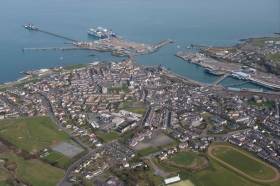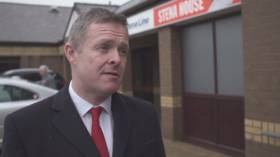Displaying items by tag: NoDeal
Brexit: Demands for No-Deal Over Fears of Impact On Port of Holyhead
In north Wales, town councillors in Holyhead, have urged the government to think again about letting Britain crash out of Europe with no deal.
Fearing the impact of a clean break from the European Union, NorthWalesLive writes, that members of Holyhead Town Council have passed a motion urging the Prime Minister to act in the interests of such ports and secure a deal with Brussels.
The Port of Holyhead is the second largest (ferry)port in the UK (after Dover), handling two million passengers, half a million vehicles and 450,000 freight units a year with the Swedish company employing hundreds of workers in North Wales.
During a recent visit to the port Michael Gove, the minister in charge of Government preparation for no-deal, said that ports are “geared up” for Brexit and should avoid any significant delays and congestion.
But Stena Line, which is the town’s largest employer, has described leaving with no-deal and no trade agreement as “the worst of all possible scenarios.”
Clck here for more on the story.
No-Deal Disruption Says Brexit Minister at Holyhead Port 'Can Be Avoided'
#ferries - There have been calls for the UK Prime Minister to remove the threat of a no-deal Brexit have been repeated by the Counsel General and Brexit Minister Jeremy Miles, following a visit to Holyhead Port.
As ITV News reports, he met with the Port's manager, Captain Wyn Parry, who set out some of his concerns about operations in Holyhead if the UK crashes out of the EU without a deal.
Welsh ports are the gateway between Ireland and the rest of Europe, with 80% of goods carried in Irish-registered HGVs between the Republic of Ireland and Europe passing through Welsh ports.
Holyhead is the second busiest roll-on roll-off ferry port in the UK - providing the link in the supply chain for businesses across Wales, the UK and Ireland.
To read a comment by the Brexit Minister, click here.
British Government to Spend £108m on No-Deal Brexit Ferries
#FerryNews - The British government has spent more than £100 million on ferries to ease potential problems in the event of a no-deal Brexit.
The Department for Transport (DfT) reports RTE News, has signed contracts with French firm Brittany Ferries, Danish company DFDS and the UK's Seaborne to ease pressure on Dover should Britain leave without a deal.
The move would allow for almost 4,000 more lorries a week to use other ports on England's south coast to prevent a bottleneck at Dover.
The additional crossings are understood to be the equivalent to around 10% of the current traffic on the Dover Strait and will see ports in Poole, Portsmouth, Plymouth, Immingham and Felixstowe (pictured above) used.
The BBC reported the value of the contracts is £107.7 million - £47.3 million to DFDS, £46.6 million to Brittany Ferries and £13.8 to Seaborne Freight.
For more on this logistical development, click here.

























































